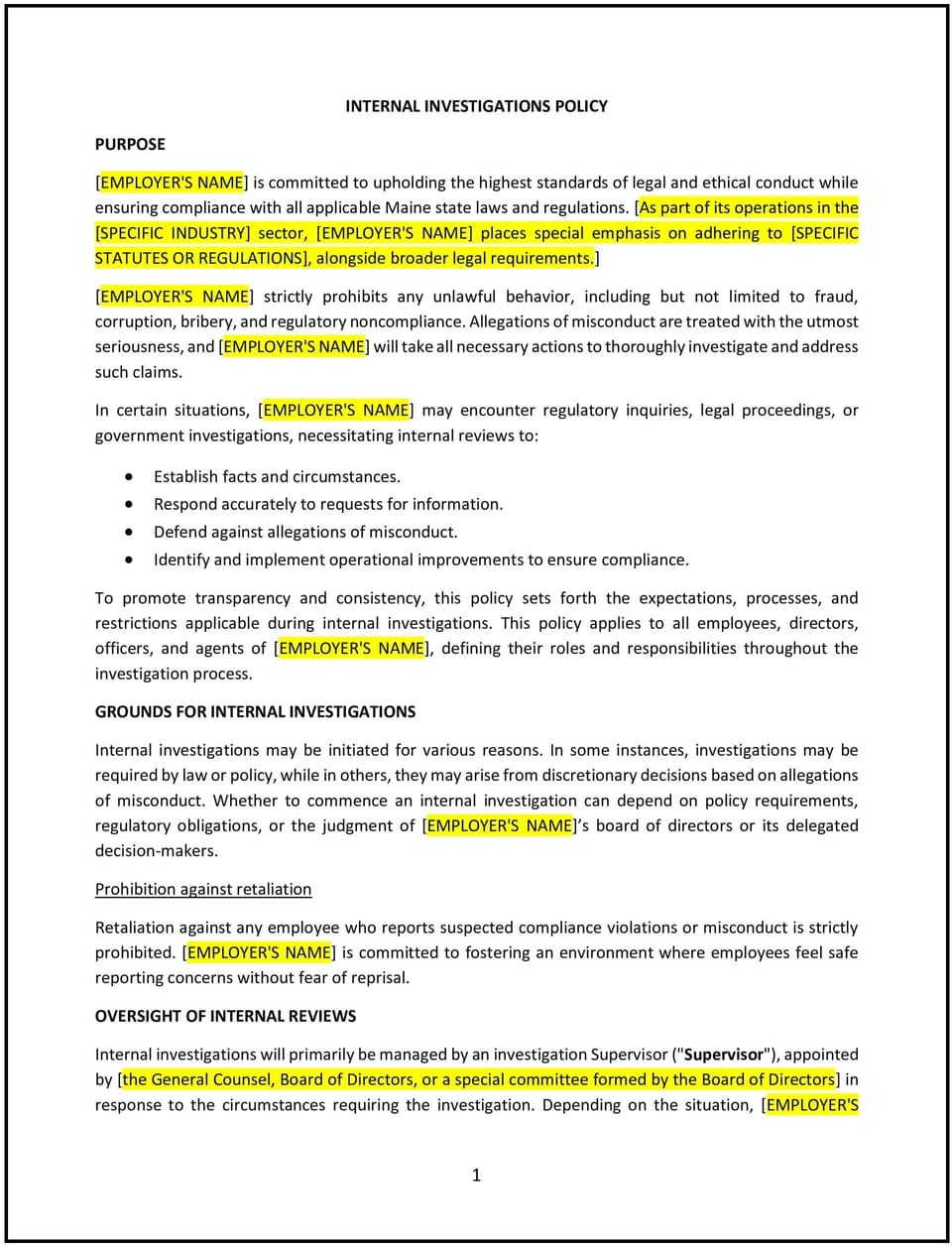Internal investigations policy (Maine): Free template

Internal investigations policy (Maine): Free template
This internal investigations policy is designed to help Maine businesses establish clear procedures for conducting fair and thorough investigations into workplace issues, such as employee misconduct, harassment, or policy violations. It outlines the steps for initiating, conducting, and concluding investigations while ensuring confidentiality and supporting compliance with Maine labor laws.
By implementing this policy, Maine businesses can promote workplace fairness, resolve conflicts efficiently, and reduce legal risks.
How to use this internal investigations policy (Maine)
- Define scope and purpose: Specify the types of issues covered, such as harassment, discrimination, fraud, or policy violations.
- Outline the investigation process: Provide a step-by-step guide, including reporting concerns, assigning investigators, and gathering evidence.
- Ensure confidentiality: Emphasize the importance of maintaining confidentiality to protect all parties involved.
- Address impartiality: Require that investigations be conducted by neutral and trained individuals to ensure fairness.
- Set timelines: Include reasonable timelines for completing investigations and communicating outcomes.
- Provide reporting protocols: Detail how findings will be documented and shared with relevant parties.
- Review regularly: Update the policy to reflect changes in Maine labor laws or workplace needs.
Benefits of using this internal investigations policy (Maine)
Implementing this policy provides several benefits for Maine businesses:
- Promotes fairness: Ensures all workplace issues are addressed impartially and thoroughly.
- Enhances compliance: Aligns with Maine labor laws and federal regulations, reducing legal risks.
- Protects confidentiality: Safeguards the privacy of employees and prevents unnecessary workplace disruptions.
- Resolves conflicts efficiently: Provides a structured approach to identifying and addressing issues promptly.
- Builds trust: Demonstrates the business’s commitment to accountability and transparency.
Tips for using this internal investigations policy (Maine)
- Train investigators: Ensure employees tasked with investigations are trained in confidentiality, interviewing, and Maine labor law compliance.
- Communicate clearly: Share the policy with employees and include it in onboarding materials and the employee handbook.
- Document thoroughly: Keep detailed records of all investigation steps, findings, and actions taken to ensure accountability.
- Ensure accessibility: Provide employees with clear instructions on how to report concerns or request an investigation.
- Monitor outcomes: Regularly assess the effectiveness of investigations and identify areas for improvement.
- Stay compliant: Monitor updates to Maine and federal laws to ensure the policy remains up-to-date.
Q: What types of issues are covered under this policy?
A: This policy covers issues such as harassment, discrimination, workplace misconduct, fraud, and policy violations.
Q: How can businesses ensure confidentiality during an investigation?
A: Businesses should limit access to investigation details to authorized personnel and ensure all participants understand the importance of confidentiality.
Q: How often should businesses review their internal investigations policy?
A: Businesses should review the policy annually or whenever there are updates to Maine labor laws or workplace practices.
Q: What steps should businesses take to ensure impartiality in investigations?
A: Businesses should assign neutral investigators, avoid conflicts of interest, and provide training on unbiased investigative practices.
Q: How long should businesses take to complete an investigation?
A: Investigations should be completed within a reasonable timeframe, typically within 30 days, depending on the complexity of the issue.
Q: How should businesses handle findings from an investigation?
A: Businesses should document findings in a report, communicate outcomes to relevant parties, and implement corrective actions if necessary.
Q: What actions can businesses take if an investigation reveals a policy violation?
A: Businesses can take actions such as providing training, issuing warnings, or implementing disciplinary measures, depending on the severity of the violation.
This article contains general legal information and does not contain legal advice. Cobrief is not a law firm or a substitute for an attorney or law firm. The law is complex and changes often. For legal advice, please ask a lawyer.


